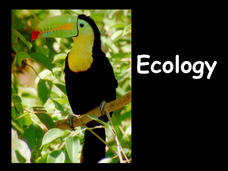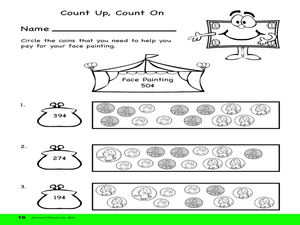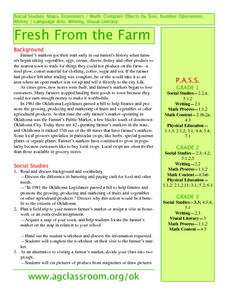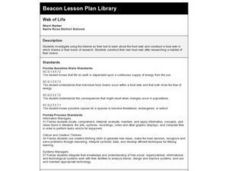Virginia Department of Education
Solution Concentrations
What happens when you combine 6.022 times 10 to the 23 piles of dirt into one? You make a mountain out of a mole hill. Scholars use dehydration to obtain percent composition and then calculate the molarity of the original...
Biology Junction
Biochemistry of Cells
Chemistry and biology work hand in hand, without one you literally wouldn't have the other. Using a presentation, individuals learn about plant cells, animal cells, cell responses, macromolecules, DNA bases, and so much more. A worksheet...
Baylor College
Heart and Circulation: Pre- and Post-Assessments
Middle schoolers demonstrate what they know about the structure and function of the heart and blood vessels. A set of 15 multiple-choice questions also addresses how the heart handles microgravity and how animals without...
Science & Plants for Schools
Photosynthesis - A Survival Guide
Young scientists learn what it takes for life on Earth to survive with this series of photosynthesis resources. Offering twelve different activities ranging from independent practice worksheets to in depth scientific...
National Wildlife Federation
Habitat Web
Young scientists weave together an understanding of ecosystems with this fun collaborative activity. Taking on the roles of different living and non-living elements of specific habitats, learners use a ball of yarn to create...
Virginia Department of Education
Thermochemistry: Heat and Chemical Changes
What makes particles attract? Here, learners engage in multiple activities that fully describe colligative properties and allow the ability to critically assess the importance of these properties in daily life. Young chemists...
New South Wales Department of Education
The Mangroves
Mangroves are a nursery for a variety salt-water organisms. Learners explore the mangrove ecosystem through audio, video, and/or images, to see the organisms that live in this environment and make food chains pertaining to this...
Howard Hughes Medical Institute
Building Ecological Pyramids
Looking for a fresh take on traditional food/energy pyramids? Conduct an innovative activity where pupils build their own! The lesson uses research data from Gorongosa National Park in Mozambique for a real-life safari touch. Scholars...
NASA
Planning Time
Ever feel there's just not enough hours in the day? Young adults explore an important part of personal development using a group of activities. After comparing how they actually spend their time with how they would like to, scholars...
PBS
The Lorax
Accompany a reading of Dr. Seuss' tale, The Lorax, with a five-item learning exercise. Questions challenge scholars to list characters' names, use text details to answer inquiries, and describe the moral of the story.
Biology Junction
Ecology
Psychologists study human relationships while ecologist study relationships between organisms in the environment. An introduction to ecology and the related vocabulary benefits scholars as they progress through the presentation and...
College Board
2018 AP® Environmental Science Free-Response Questions
Less than nine percent of all AP Environmental Science test takers scored a perfect five on the exam in 2018. Learn from the best answers as well as the common mistakes thanks to the College Board. Four questions from the test covering...
Purdue University
Mammal Food Webs
You are what you eat—or at least a part of what you eat. Budding scientists examine owl pellets to develop their own food webs. They use tooth and skull identification techniques to classify what they find.
University of Waikato
Build a Marine Food Web
Dive into a lesson on marine ecosystem interactions. Individuals learn about and devise a marine food web. The resource provides organism cards and pupils use article resources to discover interactions before modeling them in a food web.
Curated OER
Counting Change and Changing Coins
Second graders demonstrate how to count change. In this consumer math lesson, 2nd graders read the book The Penny Pot and identify the value of coins. Students complete a worksheet to practice counting coins.
Curated OER
Food Chains and Food Webs
Young scholars discuss the characteristics of producers, consumers and decomposers. Using a flow chart, they construct a food chain to visually show how organisms with different energy sources depend upon one another. Students explore...
Curated OER
Market Day Adventure
Second graders participate in the Market Day project. They produce goods, market goods, and earn money to buy goods.
Curated OER
Fresh From The Farm
Students investigate the concept of a farmer's market and how it used in the community. They conduct a survey to find the kinds of produce grown to be sold in the market. The instructional activity includes extensive introductory...
Curated OER
Food Chains and Webs
Students identify the organisms found near their school or house and observe them. In this food chain lesson students examine how an organism gets their energy and then fill in a chart to create a food web with the organisms they...
Curated OER
Web of Life - Alaska
Seventh graders research Alaska, then construct their own food web after researching a habitat of their choice.
Curated OER
The Chain Gang
Students perform a food chain simulation to determine what happens when a food chain is broken.
Curated OER
Trophic Levels and Food Webs
In this biology worksheet, students identify and locate various vocabulary terms related to trophic levels and food webs. There are 27 biology terms located in the word search.
Curated OER
Edwin Perkins: A Nebraska Success Story
Fourth graders explore the life of the inventor of Kool-Aid to unearth concepts of a market economy. Vocabulary presented helps support the learning process.
Curated OER
Where to shop?
Students study a topic of an environmental nature that is relevant to them (as individuals) on a local level, but with global implications. They consider whether their family's shopping habits have any lasting effects on the environment.
Other popular searches
- Consumers and Producers
- Science Producers Consumers
- Producers and Consumers Poem
- Marine Producers Consumers
- Producers Consumers Writing
- Consumers Producers
- Consumers, Producers

























